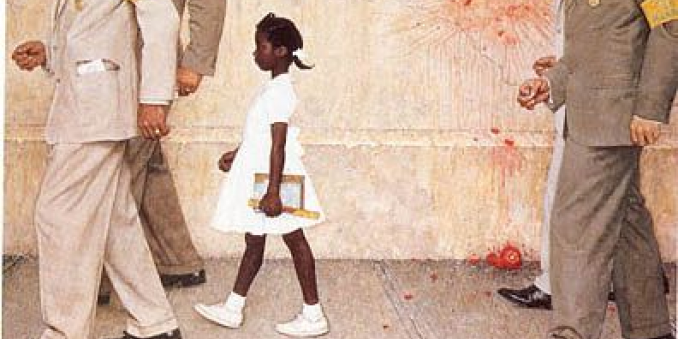February 1
Welcome to Black History Month 2021! I’m sure we would all agree that it has been a tumultuous 365 days! This year in order to honor the voices of African Americans past and present, we will have a series of Black History Month entries. These entries will come in the form of music, literature, scholarly work and other notations that tie the past to present issues along with action points in which we can participate.
Today you are invited to 'say their name' as we remember just a fraction of the many lives that have been lost due to violence, and in many cases, police violence. You are also invited to listen to a tune by the Canadian artist, Ruth B.
- Mr. Eric Garner
- Ms. Renisha McBride
- Mr. John Crawford
- Tamir Rice
- Marlene Pinnnock
- Sandra Bland
- Breonna Taylor
- Mr. George Floyd
- Mr. Philando Castile
February 8
As Change Agents, our work is never finished.
We encourage you to take a few moments to listen to the dissenting voices of inclusivity and the quiet footsteps of six-year-old Ruby Bridges as she takes courageous strides toward anti-racism in education. If she could be courageous then, we can be courageous now!
The Mandel School has made strategic moves toward an atmosphere that is anti-racist, but there is still work to do. In an effort to further shift us toward a more just space, please consider visiting the Mandel School’s Anti-Racism Resources webpage, take part in an Anti-Racist Workshop, and review this document addressing racism in our new generalist curriculum, developed by Marji Edguer, David Hussey and Zoë Breen Wood, which highlights important and sustainable movement toward an anti-racist curriculum.
February 15
While well-intended, the social work profession is not immune to discrimination, prejudice and racism.
For example, in 1968, with the assassination of the Reverend Dr. Martin Luther King Jr. still palpable, Black social workers staged a walkout during the National Conference on Social Welfare’s (NCSW) annual program meeting. This movement was fueled by the tangible experience of institutional racism within both the NCSW and the National Association of Social Workers (NASW), which was under the NCSW’s umbrella at that time. Interestingly, Whitney Young sat at the helm of both organizations, yet racism still wielded injustice (Herrick & Stuart, 2005). Soon after the walkout, the National Association of Black Social Workers (NABSW) was born.
Take some time to listen to this episode of the Doin’ The Work: Frontline Stories of Social Change podcast to learn about the history of the National Association of Black Social Workers, its current work, and future plans.
February 23
Cultivating allyship skills is important for all social workers, but social work and allyship are not distinct roles.
The University of Kansas’ Community Tool Box notes the following about allyship at a Primarily White Institution (PWI):
It is in our own self-interest to be an ally to people from diverse and oppressed groups. Ultimately, our own struggles are tied to everyone else's. Here’s why:
- We live in an increasingly diverse country. In order to organize, unify and empower communities, people need to learn how to act on each other's behalf.
- When you give support to others, you are developing allies for your own groups and your own causes—in fact there is probably no better way to make an ally than to be one to someone else.
- In order to address and change the systemic problems that cause oppression, you will need a lot of people who work together cooperatively and who are not vulnerable to divide-and-conquer tactics. Strong alliances between many groups can provide the necessary people the power to make systemic changes.
- When you are standing up against oppression, you are creating a moral standard in your community. You are putting people on notice that targeting any group will not be allowed.
- Groups are frequently isolated from each other: "Us" from "them" and "them " from "us." Often groups that are targeted feel that no one cares about "their" issues and they can't get help. Non-target groups often feel that their lives are not impacted by racism, sexism, classism, homophobia, anti-Semitism, etc.; they feel powerless, numb and distant. Being an ally is an antidote to isolation for those targeted by oppression and those in the targeting role—it empowers everyone involved.
- Our communities need the voices, opinions and help of people from many different groups. As we reach out to groups, they will be more likely to become involved in and give their energy to the bigger community.
- Last, but not least, in the process of becoming an ally, you have an opportunity to regain your humanity in a society that can often be dehumanizing.
Read more about how to Be a Better Ally in the Harvard Business Review.
Some of our students recently focused on bringing awareness toward racial honesty in SASS 350/500 Examining Implicit Bias and Everyday Language as Drivers of Racism—take some time today to watch three of their presentations:
- Anti-Racism as Humility by Joey O'Donnell
- Examining Implicit Bias & Everyday Language as Drivers of Racism Takeaways by Ellie Martin Elston
- Implicit Bias Reflection by Grant Carr
And finally, although Black History Month is coming to an end, we encourage you to reference and utilize this Black History Month reading list, submitted by PhD candidate Paul Tuschman and his doctoral reading group colleagues, to further grow and explore this year.
In solidarity,
Adrianne M. Crawford Fletcher, PhD, LISW, LCSW
Assistant Dean for Diversity & Inclusion | Assistant Professor
Grover C. Gilmore, PhD
Jack, Joseph and Morton Mandel Dean in Applied Social Sciences


